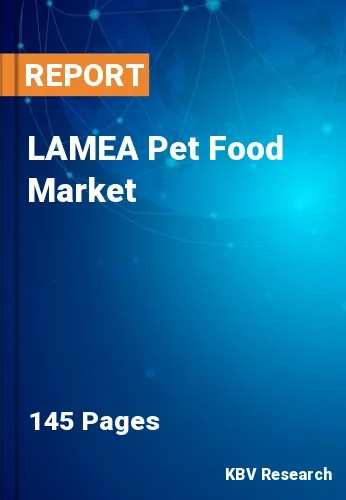The Latin America, Middle East and Africa Pet Food Market would witness market growth of 6.5% CAGR during the forecast period (2023-2030). In the year 2026, the LAMEA market's volume is expected to surge to 1,540.0 Kilo Tonnes, showcasing a growth of 7.8% (2023-2030).
Consumers are increasingly seeking pet food products made with natural and organic ingredients. This trend mirrors the human food industry's shift towards healthier and more sustainable options. With growing concerns about the environmental impact of traditional meat production, alternative protein sources such as insect-based or plant-based proteins are gaining interest. These options aim to reduce the carbon footprint of pet food production. 3D printing technology is being explored in pet food production. This method allows for highly customized shapes and textures catering to a pet's preferences and dietary needs. Insects are protein-rich and have a lower environmental impact than traditional meat sources.
Hypoallergenic pet food is designed for pets with food allergies or sensitivities. It uses novel protein sources and avoids common allergens to minimize adverse reactions. Pets with specific dietary restrictions, such as diabetes or renal issues, can benefit from specialized diets that help manage these conditions and improve their quality of life. This shift in lifestyle has created a greater demand for pet food tailored to the nutritional needs of these pets. More dual-income households give people less time to prepare homemade pet food. As a result, they turn to commercially prepared pet food for convenience. Modern lifestyles are often fast-paced and demanding.
Pet ownership in the UAE has increased, with dogs and cats being the most common pets. The UAE has a diverse expatriate population, with people from various countries and cultural backgrounds. Many expats come from regions with a strong tradition of pet ownership and bring their pet-loving culture to the UAE. The growth of pet specialty stores in Saudi Arabia has made it easier for pet owners to access premium pet food products. Due to the above-mentioned factors, the pet food market will grow significantly in this region.
The Brazil market dominated the LAMEA Pet Food Market, by Country in 2022, and would continue to be a dominant market till 2030; thereby, achieving a market value of $2,740.1 Million by 2030, The Argentina market is showcasing a CAGR of 7.1% during (2023 - 2030). Additionally, The UAE market would register a CAGR of 6.2% during (2023 - 2030).
Based on Food Type, the market is segmented into Dry Food, Wet Food, Treats & Snacks, and Others. Based on Sales Channel, the market is segmented into Specialized Pet Shops, Supermarkets & Hypermarkets, Online Sales Channel, and Others. Based on Pet Type, the market is segmented into Dog, Cat and Others. Based on countries, the market is segmented into Brazil, Argentina, UAE, Saudi Arabia, South Africa, Nigeria, and Rest of LAMEA.
Free Valuable Insights: The Worldwide Pet Food Market is Projected to reach USD 138.8 Billion by 2030, at a CAGR of 4.8%
The market research report covers the analysis of key stakeholders of the market. Key companies profiled in the report include Unicharm Corporation (DSG International (Thailand) PLC), Farmina Pet Foods Holding B.V., Nestle S.A., General Mills, Inc., Mars, Inc. (Kind LLC), The Colgate Palmolive Company, The Wellness Pet Company (Clearlake Capital Group, L.P.), Schell & Kampeter, Inc., Archer Daniels Midland Company, and Thai Union Group PLC
By Food Type (Volume, Kilo Tonnes, USD Million, 2019-2030)
By Sales Channel (Volume, Kilo Tonnes, USD Million, 2019-2030)
By Pet Type (Volume, Kilo Tonnes, USD Million, 2019-2030)
By Country (Volume, Kilo Tonnes, USD Million, 2019-2030)
Our team of dedicated experts can provide you with attractive expansion opportunities for your business.

